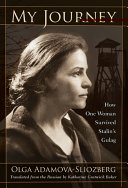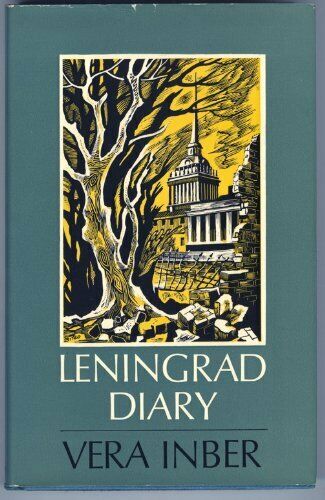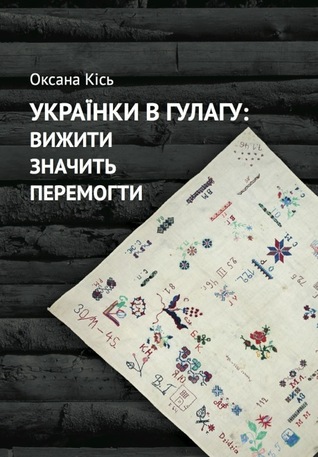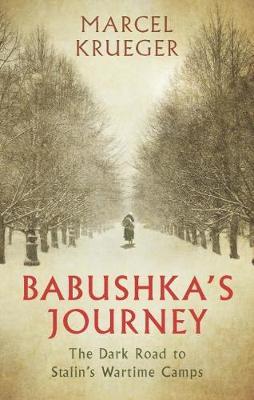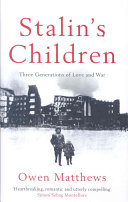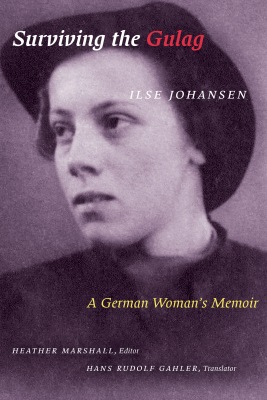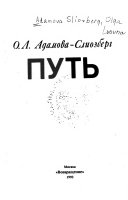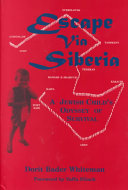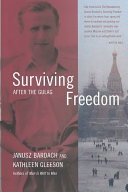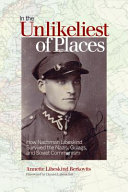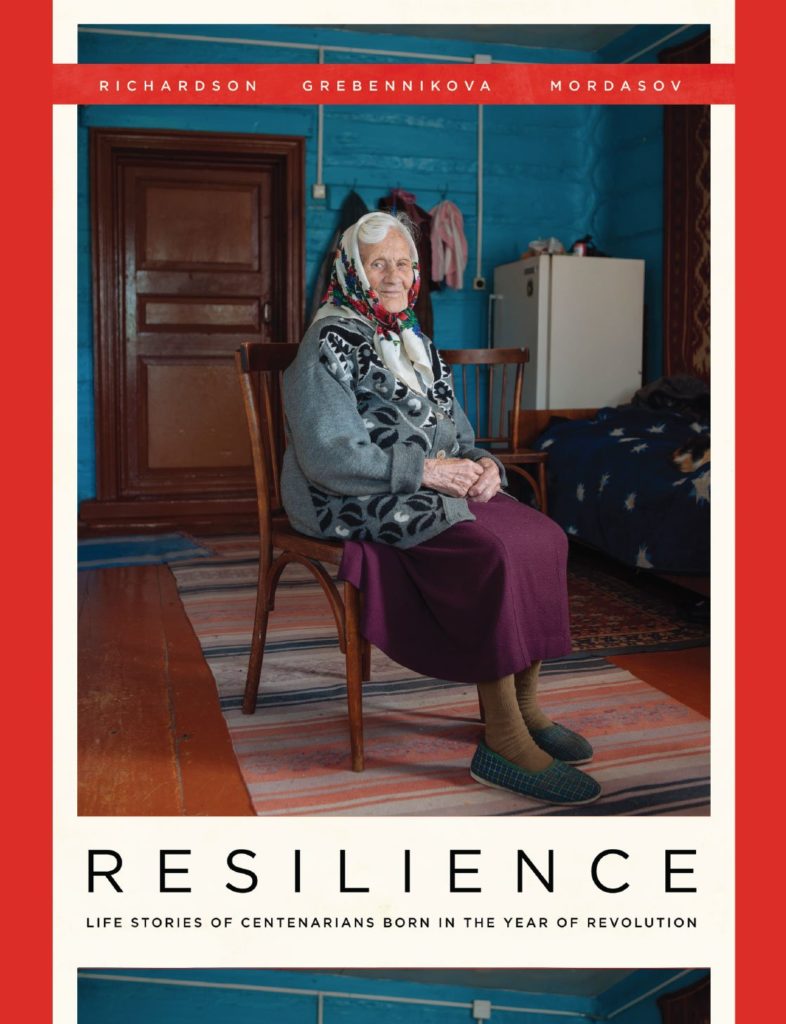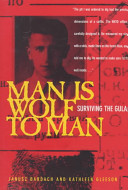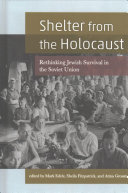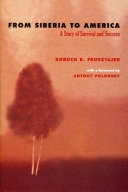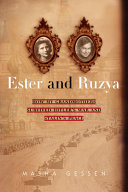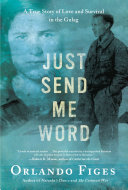Personal Narratives | Research Publications | Online Resources
Personal Narratives
“Olga Adamova-Sliozberg’s My Journey, not officially published in Russia until 2002 and here available in English for the first time, is one of the best known of all Gulag memoirs and was one of the first to become widely available in underground circulation. Alexander Solzhenitsyn relied heavily upon it when writing Gulag Archipelago, and it remains the best account of the daily life of women in the Soviet prison camps.”
“Vera Inber, a poet, kept this diary during the 900-day siege of Leningrad. Soon after the German invasion she accompanied her husband there following his appointment as director of an important medical institute. The diary is remarkable for its cool self-possession and lack of any “”poetical”” arabesques.” (source)
“Книга є першим історико-антропологічним дослідженням повсякденного життя українок-політв’язнів ГУЛАГу. Авторка застосовує феміністський підхід до вивчення жіночого минулого, аналізує особисті спогади колишніх невільниць та офіційні документи, докладно висвітлюючи різні сторони табірного повсякдення українських жінок. У книзі приділено увагу таким аспектам: національне питання, релігійні практики, жіноча творчість, прояви людяності і жіночності, жіноча взаємодопомога, жіноче тіло і сексуальність, проблема материнства за гратами. Книга розкриває малопомітні, проте ефективні жіночі способи пристосування, виживання та протидії руйнівному впливові режиму на в’язнів, що допомагали невільницям зберігати основні соціальні ідентичності, залишаючись людьми, жінками, українками.” (source)
“Babushka’s Journey is an intriguing amalgamation of fictionalized biography, memoir, and travelogue. On the one hand, it tells about the author’s grandmother Cäcilie (Cilly), who passed away in 2009, about her homeland in East Prussia and her wartime labor camp experiences in the Soviet Union, the story which itself is a combination of historical references, eyewitness interviews, Cilly’s accounts as Krueger remembers them, his own memories of his grandmother, and figments of the author’s imagination. On the other hand, it is a book about Krueger’s own journey and experiences of the places where his grandmother lived during the war and the postwar years. The narrative is rich in visual triggers—maps, photos, historical documents—while the clack-clacking of the trains, both in the mid-twentieth and the early twenty-first century, is its persistent soundtrack, sometimes soothing, at other times disquieting.”
“Almost 60 years after that, as long-closed K.G.B. records were opened, Matthews traveled to Ukraine to investigate the mystery of who his grandfather was. Opening a file crammed with “flimsy official onion-skin forms” and a few sheets of plain stationery on which Bibikov, under coercion, had confessed to being an enemy of the people, Matthews began to reconstruct the evidence of a life.” (source)
“The terrified yell of my comrades makes me stop. I drop the potatoes into the grass and turn around. He has pulled out the pistol and is taking aim. Slowly I come back.”
Surviving the Gulag is the first-person account of a resourceful woman who survived five grueling years in Russian prison camps: starved, traumatized, and worked nearly to death. A story like Ilse Johansen’s is rarely told—of a woman caught in the web of fascism and communism at the end of the Second World War and beginning of the Cold War. The candid story of her time as a prisoner, written soon after her release, provides startling insight into the ordeal of a German female prisoner under Soviet rule. Readers of memoir and history, and students of feminism and war studies, will learn more about women’s experience of the Soviet gulag through the eyes of Ilse Johansen.”
“Исключенные из жизни Воспоминания людей, прошедших через сталинские лагеря, должны быть, без всякого сомнения, вписаны золотыми буквами в историю человечества, как назидание и предупреждение потомкам. Книга Ольги Адамовой-Слиозберг выделяется среди прочих воспоминаний, ведь написана она не женой видного партийного руководителя или военного генерала, не литератором или ученым, она написана абсолютно частным лицом, женщиной, просто мечтавшей прожить тихую счастливую жизнь с любящим мужем и двумя детьми.” (source)
“Through the dramatic true story of one boy—Eliott “Lonek” Jaroslawicz—Dorit Bader Whiteman coveys the stories of the dramatic escape of thousands of Polish Jews from the encroaching Nazi menace. Whiteman draws on hours of interviews with Jaroslawicz, as well as extensive archival and other research, to narrate this saga of the only Kindertransport to leave from Russia.” (source)
“In this sequel Bardach picks up the narrative in March 1946, when he was released. He traces his thousand-mile journey from the northeastern Siberian gold mines to Moscow in the period after the war, when the country was still in turmoil. He chronicles his reunion with his brother, a high-ranking diplomat in the Polish embassy in Moscow; his experiences as a medical student in the Stalinist Soviet Union; and his trip back to his hometown, where he confronts the shattering realization of the toll the war has taken, including the deaths of his wife, parents, and sister.” (source)
“Nachman Libeskind’s remarkable story is an odyssey through crucial events of the twentieth century. With an unshakable will and a few drops of luck, he survives a pre-war Polish prison; witnesses the 1939 Nazi invasion of Lodz and narrowly escapes; is imprisoned in a brutal Soviet gulag where he helps his fellow inmates survive, and upon regaining his freedom treks to the foothills of the Himalayas, where he finds and nearly loses the love of his life. Later, the crushing communist regime and a lingering postwar anti-Semitism in Poland drive Nachman and his young family to Israel, where he faces a new form of discrimination. Then, defiantly, Nachman turns a pocketful of change into a new life in New York City, where a heartbreaking promise leads to his unlikely success as a modernist painter that inspires others to pursue their dreams.” (source)
“Call it resilience, grit, or just perseverance – it takes a special sort of person to have survived the last 100 years of Russian and Soviet history. The 22 heroes in this volume were all born in 1917 – Russia’s year of revolution – somewhere within the bounds of the Russian empire as it then existed. They lived through Civil War, Collectivization, World War II, the Cold War, and the collapse of the USSR. Indeed, their lives are a living reflection of the past Russian century, and their stories show us a side of history not available in any other resource. The authors of this project sought out these centenarians for months, then traveled over 20,000 kilometers across Russia and Eastern Europe, from sprawling metropolises to tiny villages, capturing poignant images, moving life stories, and stunning video… The subjects’ stories are recounted largely in their own voices, from transcripted interviews, and accompanied by photos taken in 2017, as well as family photos and documents from throughout their lives.” (source)
“The only English-language memoir since the fall of communism to chronicle the atrocities committed during the Stalinist regime, Bardach’s gripping testimony explores the darkest corners of the human condition at the same time that it documents the tyranny of Stalin’s reign, equal only to that of Hitler. With breathtaking immediacy, a riveting eye for detail, and a humanity that permeates the events and landscapes he describes, Bardach recounts the extraordinary story of this nearly inconceivable world.” (source)
“Shelter from the Holocaust came to fruition as the result of the opening of formerly classified Soviet and Polish archives, determined efforts to interview the last remaining Holocaust survivors, and the growing interest in the histories of displaced persons and migration. This pioneering volume will interest scholars of eastern European history and Holocaust studies, as well as those with an interest in refugee and migration issues.” (source)
“During World War II, many Polish Jews were forcibly deported from Russian-occupied eastern Poland to Siberia, where they were subjected to appalling suffering and oppression under the Communist regime.
From Siberia to America is a memoir of one man who survived a childhood in those Siberian work camps. After the war he returned to Poland and found that his homeland, under Communist rule, had become a land of little opportunity.”
“In this “extraordinary family memoir,”* the National Book Award–winning author of The Future Is History reveals the story of her two grandmothers, who defied Fascism and Communism during a time when tyranny reigned… With grace, candor, and meticulous research, Masha Gessen, one of the most trenchant observers of Russia and its history today, peels back the layers of time to reveal her grandmothers’ lives—and to show that neither story is quite what it seems.” (source)
“A heroic love story and an unprecedented inside view of one of Stalin’s most notorious labor camps, based on a remarkable cache of letters smuggled in and out of the Gulag… Orlando Figes, “the great storyteller of modern Russian historians” (Financial Times), draws on Lev and Sveta’s letters as well as KGB archives and recent interviews to brilliantly reconstruct the broader world in which their story unfolded. With the powerful narrative drive of a novel, Just Send Me Word reveals a passion and endurance that triumphed over the tragic forces of history.”
